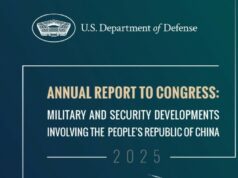The Trump administration has stopped U.S. scientists from participating in key U.N. climate change assessments, sources told Reuters, as part of its wider pullback from climate action and multilateral cooperation.
The stop-work order affects staff members of the U.S. Global Change Research Program and the National Oceanic and Atmospheric Administration who engage with a key working group of the Intergovernmental Panel on Climate Change.
It means the U.S. will not attend a major IPCC plenary meeting in Hangzhou, China, next week, to plan the seventh global climate assessment, said one of the sources.
The White House declined to comment and the State Department did not respond to a request for comment.
America’s Behaviour ‘Concerning’
“The power of the IPCC is that governments, businesses and global institutions can operate with shared conclusions. The U.S. being completely removed from that process is concerning,” said Delta Merner of the Union of Concerned Scientists.
While American scientists will be in attendance and continue to work on climate research used by the IPCC, the absence of the U.S. in the IPCC process will be felt.
The Hangzhou meeting from 24-28 February is expected to make a few key decisions that will shape the outcomes of the next climate assessment, including around the role of carbon removal and capture technology.
China’s foreign ministry said on Thursday it was unaware of the withdrawal of U.S. participants.
The U.S. is a co-chair along with Malaysia of a working group on climate mitigation, or ways to reduce greenhouse gas emissions.
The U.S. had also pledged around $1.5 million to support the IPCC, though that money had not yet been appropriated by Congress.
Unsurprising Move
Withdrawal of the U.S. from the IPCC does not come as a surprise to climate scientists, given President Donald Trump’s moves to withdraw the U.S. again from the Paris climate agreement, claw back U.S. global climate finance and sever international partnerships on climate.
“This would align with Trump’s signals around climate action,” said Kathryn Bowen, a professor at Melbourne University and a lead author on the IPCC’s sixth assessment report published last year.
She said the loss of federal support comes at a time of reduced funding for climate science globally.
“Unfortunately, there has been a slow reduction of funding support for authors in the IPCC process in the last few years,” Bowen said. “High-income countries are looked upon as important sources of funding for colleagues from the Global South.”
(With inputs from Reuters)





